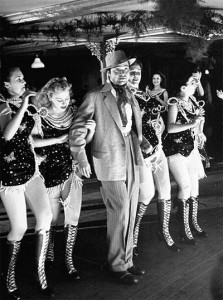
It is perhaps not well known that the song “The Union Forever” on the White Stripes album White Blood Cells [2001] was directly inspired by Citizen Kane [1941], but perhaps this connection is not so surprising. Jack White has always had an obsession with gothic themes and aesthetics; this has manifested itself in both the strain of English gothic (2003’s Elephants) and the strain of American southern gothic (2005’s Get Behind Me Satan). Citizen Kane is gothic itself: from the images at the front gate of Xanadu, to the vast interior fireplace, to the theme of lonely souls trapped in imposing, crumbling structures; from the dour souls of Kane’s mother and Kane’s surrogate banker father, Mr. Thatcher, to the tomb-like vault that holds Thatcher’s personal journal. White has always grabbed inspiration from where he could, but that has always seemed to be primarily from other musicians. In the case of Orson Welles, it seems that White found a kindred spirit especially in the incarnation of Charles Foster Kane; in fact, there is a picture of a young Welles that looks, at least in spirit, a lot like White.
White literally lifted patches of dialogue from Kane for “Union.” In fact the title of the song itself is from an early scene in Kane in which the young Kane is seen in one of his few happy times playing in the snow with what becomes the film’s elusive key to unlocking the mystery that was Charles Foster Kane—his sled “Rosebud.” As he plays in the snow drifts, Kane continues to shout “The Union forever!” Of course the irony is that the union with his mother will fall apart soon after as he is taken away to become a ward of Mr. Thatcher’s, and, perhaps, more so than the sled is the phrase in terms of unlocking the key that drove Kane throughout much of his life—to mend that broken union. He was always looking for the love that he lost in childhood.
As for the lyrics, most are directly from Kane’s key dialogue. It might be no accident that the refrain comprise lyrics sung in the film. Perhaps this was what initially inspired White; perhaps White simply filled out the rest of the song with spoken dialogue from the rest of the film. The following refrain in “Union” are from a song sung by a black servant of some sort during one of Kane’s extravagent outings into the Florida Everglades:
It can’t be love
For there is no true love
It can’t be love
For there is no true love
The following lyrics come from a combination of scenes: Susan Alexander Kane verbally attacking her husband’s obssessive quest for public adoration and the News on the March segment at the beginning of Kane commenting on the vastness of Kanes Xanadu estate:
Sure I’m C.F.K. [ed. note: Charles Foster Kane]
But you gotta love me
The cost no man can say
But you gotta love me
The scene between Thatcher and Kane as he is about to become his own man and strike out into the world is captured in “Union” as well as Thatcher’s question to Kane decades later about what he would have liked to been:
Well I’m sorry but I’m not interested in gold mines, oil wells, shipping or real estate
What would I liked to have been?
Everything you hate
And the scene in which Kane steals the entire journalistic staff from his newspaper’s competitor, The Chronicle, and treats his people to a wild party also served as a source for lyrics. These lyrics as well as the refrain were also lyrics in the film; these particular lyrics were from the main showman of the party as he sings in loving jest about Kane:
There is a man, a certain man
And for the poor you may be sure
That he’ll do all he can
Who is this one?
Who’s favorite son?
Just by his action has the traction magnets on the run
Who likes to smoke
Enjoys a joke
And wouldn’t get a bit upset if he were really broke?
With wealth and fame, he’s still the same
I’ll bet you five you’re not alive
If you don’t know his name.
And near the end of the song, White sings the following:
You said the union forever
You said the union forever
You cried the union forever
But that was untrue girl
These lyric are perhaps, like the song’s title, the key to understanding Kane. There was never any permanent emotional union in Kane’s life. He died with everything and, simultaneously, nothing. Of course, the central girl in Kane’s life was his mother—hardly a girl. But perhaps this last line is the key to unlocking the personal hold that Kane apparently has on White; perhaps there was a girl in his life and a union that he thought was forever. Perhaps no man can say.
Justin Baker